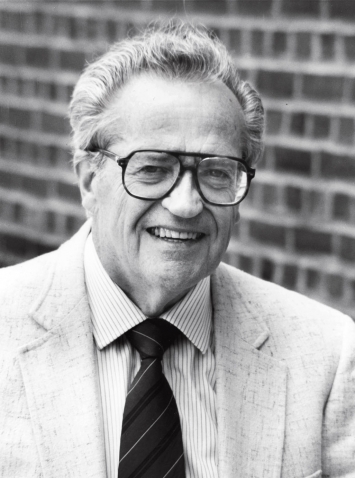René Galand, professor emeritus of French, died on May 28 at the age of 94 at his home in Hingham, Mass. He was a prize-winning scholar of 19th- and 20th-century French literature, a brilliant teacher and mentor, and a prolific writer of critical and creative works in French and English—and in Breton, the language spoken in his native Brittany. He joined the French department in 1951 and retired after 42 years on the Wellesley faculty.
A generalist at heart, René’s intellectual and aesthetic interests ranged widely, and his knowledge appeared similarly boundless. His publications on French literature include five books on authors from Chateaubriand, Renan, and Baudelaire in the 19th century to Camus, St.-John Perse, Robbe-Grillet, and writers of the Surrealist and Oulipo movements in the 20th, in addition to numerous articles and reviews in French and American periodicals. These achievements were recognized in 1971 by the French government, which awarded him the Palmes Académiques “in recognition of his scholarly distinction and many services rendered to French culture.” René wrote essays on American writers as well, including Melville, T.S. Eliot, and Jack Kerouac, and he had an abiding interest in speculative fiction, including the work of H. P. Lovecraft.
René’s academic specialty was poetry, especially modern poetry. But poetry was his life in another way, too. He was himself a skilled poet in the language of his Breton upbringing, and under his Breton name, Reun ar C’halan, published three books of poetry, the first of which was awarded the Xavier de Langlais Prize for Breton literature in 1979. There followed volumes of memoirs and short stories, and dozens of individual poems and articles in specialized journals and collections. In 2003, he received a second award, the Imram Prize, in recognition of this distinguished œuvre of Breton poetry and writings on Celtic culture.
René entered Yale as a graduate student in 1947, but his path to the academy was anything but conventional. In 1943, during the German occupation of France, he joined the French resistance and in 1944 fought for the liberation of his country in the wake of the Allied landings in Normandy. He elaborates in his Wellesley faculty profile:
In August and September 1944, my unit joined forces with the combat commands of General Middleton (from Patton’s Army) against the Kreta Korps (25,000 men) commanded by the German General Ramcke, and we captured the fortified position of the Menez Hom and the Naval Aviation base of Lanvéoc-Poulmic south of Brest while the Americans forced the surrender of General Ramcke and captured the port of Brest and its U-boat base.
René resigned his commission in the fall of 1946 and joined his parents and sister in the United States.
To us younger members of the department—now ourselves the Old Guard—René was our scholar-father, the go-to authority on matters literary and bibliographic. Asked to comment on the draft of an article, he would invariably answer at length, in remarks written by hand on 8 ½ x 11 sheets of blue paper. A dedicated educator, he guided generations of Wellesley students and extended a helping hand to aspirants in the profession, some of whom he didn’t know, but all of whom understood his message of inclusion: “You are one of us.” Having applied for a job in a year when René was chair of the department (1968–72) but there were no openings, I still have the two-page letter he wrote—by hand, on the regulation blue paper—informing me of the situation. Astonished to receive something other than a Xeroxed form letter, I vowed that one day I would work in this French department whose chair cared enough to respond in person.
We junior colleagues valued another mark of René’s openness and generosity: the cocktail parties he and his wife, France, regularly hosted at their home. You arrived and were greeted by their daughter, Caroline (Wellesley ’85), doing the rounds with trays of goodies; later their son, Joel, would treat the guests to a mini violin recital. There was no tinge of noblesse oblige to these gatherings. René clearly felt he had a responsibility as a senior member of the department to bring people together in ways that sanded down the professional edges and encouraged off-duty sociability among wildly disparate personalities (“You are one of us”)—an old-school commitment to sodality and solidarity that, it bears saying, seems outdated and almost quaint in 21st-century academe.
In his on-duty moments, René was formal, by temperament and by choice, but behind that formality lay a subtle wit, a warm smile, a deep kindness, and a vital commitment to literature, to the life of ideas, and to his colleagues. By virtue of his service to France in World War II, he belonged to what’s been called the “Greatest Generation,” most of whose members are now gone. To the junior faculty who flourished under his mentorship and to many others at Wellesley, René was a one-man Greatest Generation, the perfect scholar-teacher—tested, seasoned, accomplished, unstintingly placing his enormous gifts in the service of a common good. Although he, too, is gone now, his example will endure in the memory of those of us who were fortunate to account him our colleague and friend, and to stand in his glow.





We ask that those who engage in Wellesley magazine's online community act with honesty, integrity, and respect. (Remember the honor code, alums?) We reserve the right to remove comments by impersonators or comments that are not civil and relevant to the subject at hand. By posting here, you are permitting Wellesley magazine to edit and republish your comment in all media. Please remember that all posts are public.